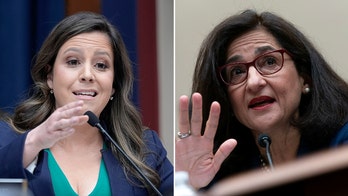
Pennsylvania Sen. Arlen Specter said Tuesday that he would float the idea of a national referendum on health care reform when he returns to Washington after the start of his August recess was spent facing down boisterous crowds at town hall meetings.
At one such forum in Lebanon, Pa., Specter heard from a string of lively constituents, including one who suggested deciding the issue the good, old-fashioned American way -- by majority rule.
Asked by one participant about the idea of a national referendum, Specter, who recently switched parties to become a Democrat, called the idea "fascinating" and said he would take the suggestion to Washington.
"Well, that's a fascinating idea to have a referendum," Specter said. "Well, that's one of the ideas I'm going to take back to Washington, a referendum."
However, he noted that the federal government currently lacks any mechanism for doing so.
American University history professor Allan Lichtman said such a move would probably be unprecedented.
"I don't know of any national referendum the United States has ever had," Lichtman said.
So far, the call for a national referendum has been limited mainly to blogs and comment pages on news Web sites. Both sides of the debate have suggested it, though, as a way to let everyone weigh in on the thorny issue of government-sponsored health insurance.
Around the nation, lawmakers are being grilled by hundreds of concerned and sometimes confrontational constituents about the plan that is just one committee away from reaching the floors of both chambers of Congress. Polls and town hall meetings have revealed a deep split in public opinion over the health care reform plans on the table.
A Rasmussen survey released Tuesday showed public support for the Democrats' plan had dropped to a new low, with 42 percent of voters in favor of it. Meanwhile, 53 percent were opposed.
The individual who asked Specter about the referendum idea Tuesday noted the national tension and suggested a 2010 referendum could be the best way to put health care reform to a fair test.
"We'll tell you if we like your plan. How's that work?" the questioner said.
Congressional aides on Tuesday said they had not heard any discussion of a health care reform referendum during talks on Capitol Hill.
Lichtman said that while a mechanism may not exist to hold a national policy vote, the states could individually hold their own referendums -- but he noted that some states don't have a referendum system either.
"It would be very difficult at best," he said, adding that it would be "quite expensive in the middle of a recession."
President Obama's timetable for passing health care reform has extended well into the fall. But the August congressional recess has proved to be the most challenging period so far for the White House to keep the momentum alive for comprehensive legislation.




